#and the characters' names are only in katakana not kanji or hiragana
Text
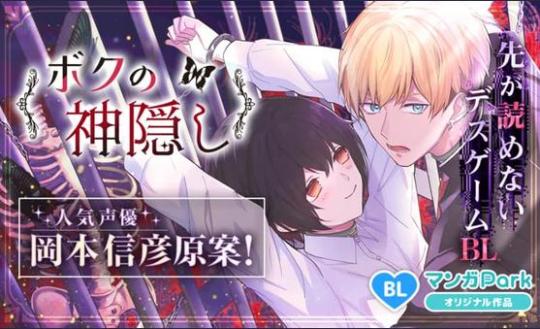
Time for a lighthearted review!
By now a number of people have heard of ボクの神隠し(boku no kamikakushi), aka “My Spiriting Away” or “My Mysterious Disappearance,” aka the BL manga that Okamoto Nobuhito, voice actor of Bakugou Katsuki, was involved in. It is available to read for free in Japanese here with a total of three chapters. This post contains spoilers for the ending.
Here’s a Q&A peppered with my thoughts on it.
The Premise
Crybaby Uzuki idolizes his childhood friend Haruto who always protected him, but since they started high school, their relationship has soured, leaving Uzuki utterly alone. One day, the pair are kidnapped by a strange man and forced to participate in a mysterious game of life-or-death.
How is Okamoto involved?
Okamoto is credited for the 原案 (gen’an). A corollary industry term in English would be “original idea” or possibly “scenario.” In my experience with comics, this suggests he created the characters and premise, then wrote the concept out and submitted it to a second party to be fleshed out for full production.
The script is credited to Production Beijyu (プロダクションベイジュ), a company who offers a variety of production and promotion services with a focus on editing and proofreading books, magazines, manga, and anime.
The manga—so the artwork and all of its production—is credited to 戸真伊まい, a name I can only guess is read as Tomai Mai, which sure sounds like a pen name and doesn’t appear to be linked to any other published work. This could be for a lot of reasons; the artist might be totally new or they might have worked in other genres and chose a unique pen-name for BL, but the only thing I found attached to this name online was their Twitter account.
How’d it get made, anyway?
As far as I can tell, Okamoto must have personally reached out to Beijyu and applied for their services to help make his idea a real thing. Beijyu gear themselves towards small, independent artists and authors, especially those who haven’t debuted with a magazine or printed publication yet.
For those unaware, manga is a massive industry in Japan, and it can be extremely difficult to get your foot in the door. Many creators talk about having their concepts rejected repeatedly by magazine after magazine, or getting a single one-shot published and then struggling to keep the momentum. There’s a reason all of the huge Shounen Jump creators talk about the intense pressure to keep their work popular and to avoid getting dropped from publication by any means necessary.
Boku no Kamikakushi is available for free and I haven’t heard of any plans for a physical release. To be honest, this suggests to me that Okamoto genuinely wanted to get his story made regardless of profitability—he isn’t just a celebrity attaching his name to a series for attention. There wasn’t some industry demand or opportunity that he took advantage of for professional gain, he must have been the one to initiate this endeavor, and honestly, good for him.
Is it really bkdk?
Nah. I will grant you that the tropes at play certainly reveal Okamoto’s tastes, and we sure could extrapolate about his feelings on bkdk from those tastes. But beyond the similarities in backstory, base themes, and design aesthetic that people have pointed out, the couple have very little in common with bkdk, and in fact, the way they diverge is kind of hilariously shocking??
Okay, fine. What’s their deal, then?
Uzuki is a yandere rich boy who likes to get choked. Haruto is honestly a hapless, horny victim in all this.
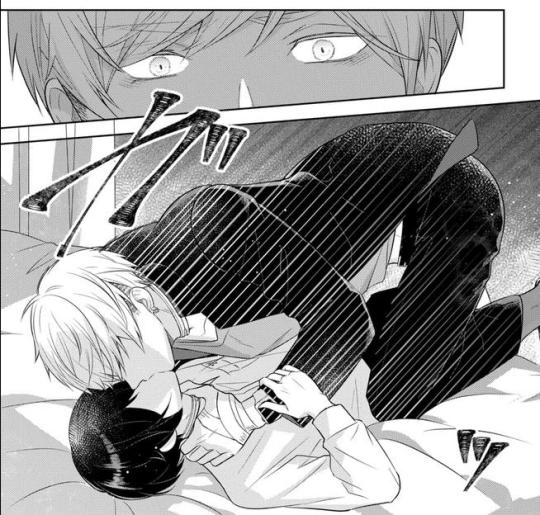
What!?
Yeah. The “mastermind” behind the kidnapping is Uzuki himself, who staged the whole thing with his butler. Basically, their high school classmates tease Haruto for being associated with Uzuki, the son of the richest noble in town; Haruto resents it so he distances himself from Uzuki and rejects him. Uzuki ends up lonely with no friends and missing Haruto, so he stages his own kidnapping and puts them both in the “death game” as a way to force Haruto to remember his childhood promise to protect Uzuki as his hero.
That’s insane???
YES. IT IS ABSOLUTELY INSANE.
It’s especially funny because the parameters of the death game don’t technically require them to have sex or get intimate, Uzuki is just a fucking freak and Haruto is confused by his own horniness and goes along with it. The first trial involves a selection of drinks, one of which contains poison, and they have to keep choosing one to drink from until someone dies. Haruto ends up poisoned, and Uzuki uses his prize (“one wish”) as the winner to get the antidote and save him, of course passing it to Haruto via full-on mouth kiss.
Haruto has a gay crisis about it.
The second game: whoever raises the other person’s heart rate to 130 beats per minute first wins, and the person with the elevated heart rate dies. Haruto’s heart rate spikes from aftereffects of the poison, and Uzuki’s solution is… for Haruto to choke him… on the bed they woke up on… so his heart rate increases as well. And then he asks Haruto to kiss him, too, and they just start making out until Uzuki’s heart rate hits 130. Haruto gets upset because he lost his head and ended up dooming Uzuki, but then somehow they arrange for this death to also be nullified, and they end up continuing to play the game for three days.
Three whole days!?!
THREE DAYS! This kid traps Haruto in a dungeon so he can make him participate in weird, sadistic, horny shenanigans for three days!
And then when they finally escape and everything is revealed, Haruto is just blankly confused and has this absent look on his face, repeating that he’ll protect Uzuki. The butler says that Uzuki performed excellent mind control, but then Uzuki imprisons the butler so it can be “just the two of them.”

What the fuck, Okamoto???
Right? And you know what, it isn’t my jam at all, but can we just take a moment to recognize that a professional voice actor who is popular and prominent in the public eye wanted his weird horny BL idea to come to fruition, so he went forth into the world and made it so? And he didn’t even hide behind a pen name or anything, he wants people to associate him with it, he’s promoting it! He loves the hell out of it!
Like, I’m pretty astounded by that, and honestly I respect it. More people should just make things that cater to their own tastes without any self-consciousness about it. Wave your freak flag high, Okamoto.
#boku no kamikakushi#bakuhatsu silly reviews#this is THOROUGHLY unrelated to mha#but I thought it'd be fun so here we are#also there are some typographical choices unique to small press and online comics that I find super interesting#for example how Uzuki uses the pronoun boku EXCLUSIVELY in katakana#while Haruto uses the standard kanji for his pronoun ore#and the characters' names are only in katakana not kanji or hiragana#and you even see little internet slang like ww for laughing#I'm just here dissecting minute choices in how Japanese is written#don't mind me#anyway proud of okamoto for revealing himself to be a total weirdo#just like the rest of us#hope this post was elucidating for everybody lmaooo#now back to your regularly scheduled programming
29 notes
·
View notes
Text
got the 7/11 casual racism 1 2 combo when looking at chips today
#Context: 7/11 has chips with Chinese characters on them. Labeled Japanese but abbreviated so 1st hit is the accidental slur#2nd hit is the name isn't kanji despite Japanese sharing Chinese characters. It's Chinese. Bc the country of origin is fucking China#I had my suspicions bc I feel like a bag of chips with Only Kanji would be weird! No hiragana/katakana but idk I guess#On the back of one of em? Translated label. Country of origin China. Alrighty then! Very cool#Not gonna ruin my day but like... Cmon... Is it too much to ask for obviously Chinese things to not be labeled as Japanese... And also#Standardize the shortening of Japan/Japanese to fucking JPN...
0 notes
Text
Japanese Linguistic Observations in Spy x Family - part 2
Part 2 - Anya's "Anya-isms"
I think Anya has one of the most interesting ways of speaking out of all the SxF characters. But like with Twilight's dialogue that I previously discussed, it can only be fully appreciated in the Japanese version. Probably the most noticeable thing about her dialogue is how it's written compared to the other characters.
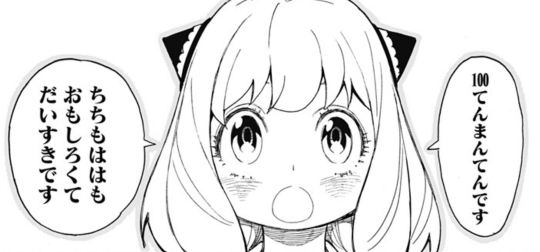
Written Japanese is comprised of three different alphabets: ひらがな (hiragana) and カタカナ (katakana), which together are referred to as "kana," and 漢字 (kanji). Kanji are the characters that hold the meaning of words, while kana simply represent the various Japanese syllable sounds and don't have any meaning on their own (much like the letters of the English alphabet). There are only about 100-ish total unique kana symbols, however, there are over 2,000 kanji in common use today. So Japanese children will start out learning kana and then learn kanji gradually during their school years. This is why Japanese children's books are typically written only or mostly in kana. This is also why manga and books aimed at a younger audience will have kana "translations" of kanji written above kanji characters, which are called furigana.
With that in mind, it's not surprising that all of Anya's dialogue in the Japanese version of the SxF manga is written entirely in kana. Even though using kanji in her dialogue wouldn't necessarily mean she knows kanji, reading a character's dialogue only in kana definitely gives off childish vibes – it conveys feelings of youthfulness and innocence, like "they're speaking only in kana because they don't know the kanji for these words…they're just a little kid, after all." At least, that's the feeling I get when I read Anya's dialogue. Though I haven't read enough manga in Japanese to say for sure, it seems like this concept of making little kids speak only in kana is not unusual, as there's at least one other example I know of: a manga from the mid-2000s called Yotsuba also has a titular 5-year old whose dialogue is written only in kana.
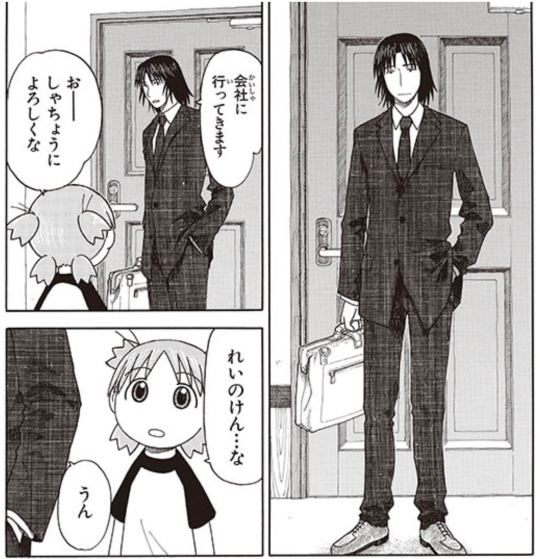
What's also interesting is that all of the other Eden kids speak "normally," using kana and kanji properly in their dialogue. This helps to convey the fact that, despite Anya being roughly the same age as them, their "rich family" upbringing has forced them to grow up faster. In the below panel, you can see how Damian's dialogue uses kanji (with furigana translations) while Anya's uses only kana, even for words that have kanji.
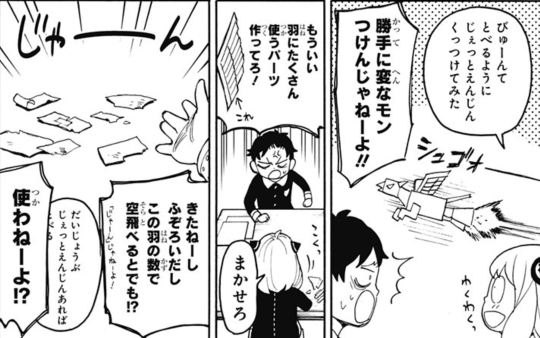
Interestingly, I found at least two cases where Anya does use kanji in her dialogue: when she's calling out the name of her big "Arrow of Light, Seize the Star" move during the dodgeball game, and when she calls out her "Lighting Bolt, Deliver my Aid" move when she tries to throw Yor's weapon back on the deck in the cruise arc. As you can see in the below panels, the names of these "moves" is written in kanji (with furigana translations). This makes sense not only because this is parodying shonen series where the characters shout out the names of their moves, but because it emphasizes how determined Anya was at these moments.
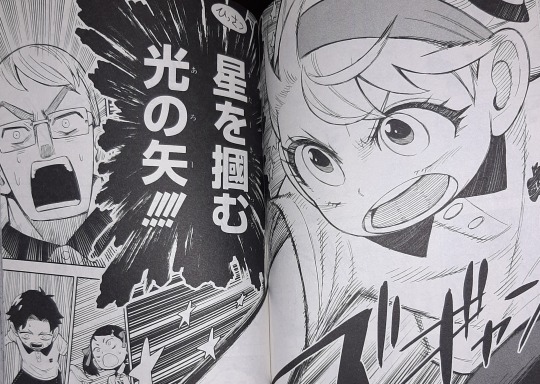
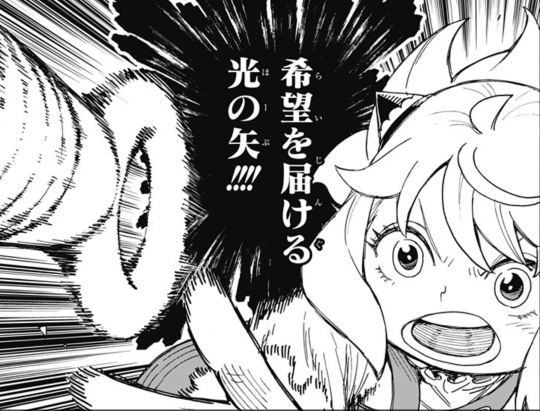
But going back to how Anya's speech compares to the other kids, another thing that stands out is that she speaks very "plainly." Her grammar is (mostly) correct, except for a few mistakes you'd expect a little kid to make. But she uses pretty much no colloquialisms, almost as if she knows the language but lacks the experience for using it in normal social interactions. I don't think this is unusual for a kid her age who's still learning, but it definitely stands out when compared to her classmates. For example, in the below panel, Becky uses normal interjections and other colloquialisms in her speech, like "ne" (ね), "wa" (わ), and "yo" (よ), which are all standard Japanese linguistic devices for softening or emphasizing your sentences. However, Anya doesn't use things like this in her speech. Again, this makes her speech come off as very plain and abrupt, almost like she's not a native speaker.
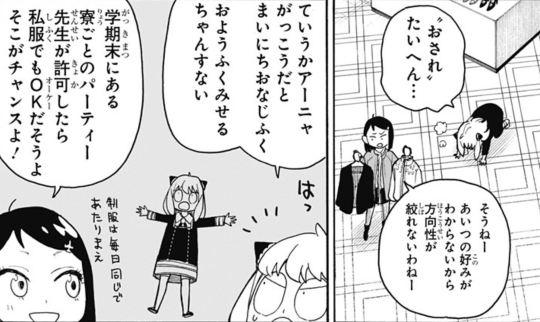
She also refers to herself in third person all the time in the Japanese version. In fact, I don't recall her ever using an "I" or "me" pronoun. I don't know why the English version of the manga doesn't keep this characteristic of her speech. I think it's very important in highlighting the childish aspect of her personality.
Putting all this together – the fact that she doesn't use typical colloquial speech and refers to herself in third person – really emphasizes the childish, naive, and almost baby-like nature of her character. I'm curious if Endo made her speak this way simply to show what a little kid she is compared to her classmates, or if it will somehow tie back to whatever roots she has in classical languages that he keeps hinting at. Regardless, as I mentioned in my full Anya analysis, what she lacks in speech and school smarts, she makes up for in empathy and resourcefulness.
Besides all this, Anya does make typical speech mistakes a normal kid would make, like mishearing words or saying things wrong. She mostly uses casual speech, but does try to use keigo (polite speech) on occasion, though not always correctly. For example, she says "ohayaimasu" (おはやいます) for "good morning" instead of "ohaiyou gozaimasu" (おはようございます).
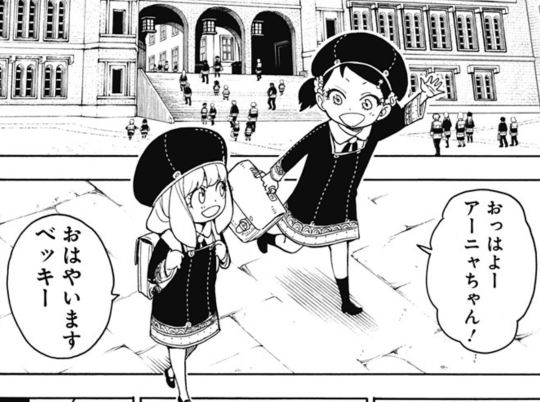
But the most consistent "mistake" she makes (though it's not really a mistake) is what she calls Loid and Yor – "chichi" (ちち) and "haha" (はは) respectively.
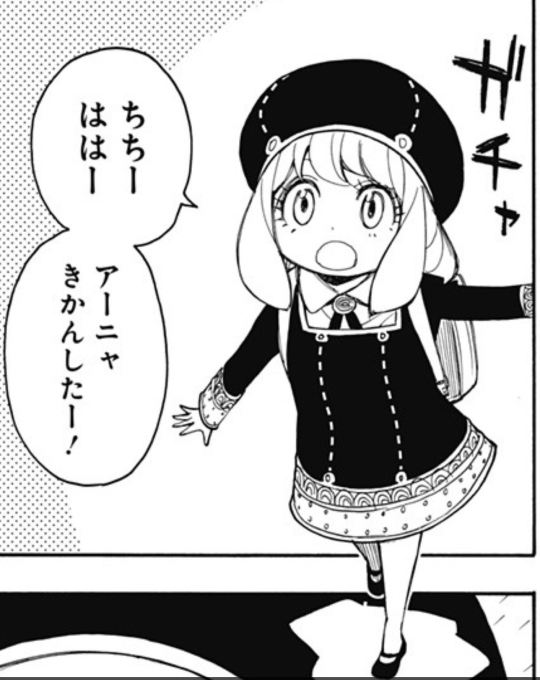
Japanese has many different words for relatives depending on whether you're talking about your own relatives or someone else's, and whether you're talking to them or about them. "Chichi" and "haha" are the general, neutral terms for "father" and "mother," and are also used when talking about your parents to someone else. However, they're not used when talking directly to your mother and father. There are many other words for that, the usual ones being "o-tou-san" (お父さん) and "o-kaa-san" (お母さん), or some variations of these with different honorifics. Damian refers to his dad as "chichi-ue" (父上) which is very formal, while Becky calls her dad the actual English word "papa" (パパ) which is very informal and normal for kids to use. But again, "chichi" and "haha" are typically only used when talking about your parents, not to them the way Anya uses them. This started from the very first chapter where Loid asks her to call him something that sounds "elite." He originally suggests the very formal "o-tou-sama" (お父さま), but when Anya says "chichi," he doesn't bother to correct her.
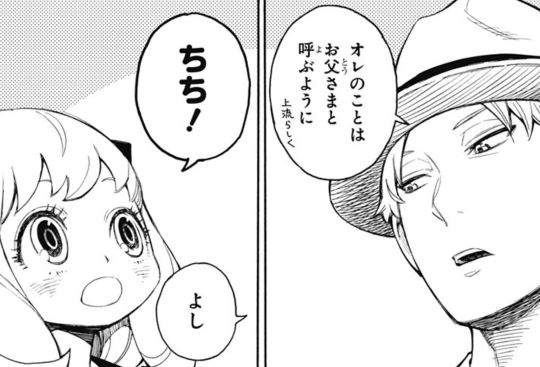
Hearing a little kid call her dad and mom "chichi" and "haha" is kind of like calling them "my father" and "my mother" even when speaking to them directly – it's not wrong necessarily, just strange. But again, this serves to further emphasize the childlike nature of Anya's character.
<- Return to Part 1
Continue to Part 3 ->
601 notes
·
View notes
Text
I—
This is why language barrier SUCKS. In the manga (and the Japanese dub), the way Satoru replies to Suguru’s concern for him on Okinawa beach is so nuanced, it gets lost in translation.
Chapter 70, Satoru’s english line is “you’re here too.”
The original Japanese version is “オマエもいる”. (Omae mo iru). On the surface, that also means “you’re here too.” But there is so much nuance with the chosen word for “you”, オマエ.
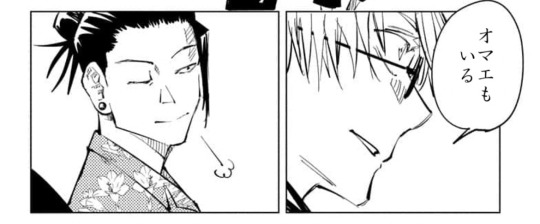
Generally speaking pronouns are avoided altogether in Japanese, but especially the ones addressing someone as “you.” It can be seen as derogatory, rude, or weird, so a lot of people avoid it and use someone’s name or title instead.
Especially for “Omae”, generally it’s used to signify the speaker sees the other person as lower than themselves. When it doesn’t mean that, it can mean:
- addressing a very very close friend (usually between men only) and this implies a certain level of trust and understanding between the two for the point to come across as closeness and not disrespect
- addressing one’s beloved as a sign of protectiveness (this is a more recent and modern application of the word)
Satoru wouldn’t be addressing Suguru in a rude way. We all know how deeply he respects him, no matter what. What I think is very interesting is that Akutami chooses to write it out in Katakana (オマエ) instead of Hiragana (おまえ) or Kanji (お前). Generally speaking Katakana is only reserved for foreign words, which makes it stand out more. It could be stylistic. Or it could be to put emphasis on the word.
I think it’s meant to add depth to the bond between Suguru and Satoru. It’s as if to convey, these two characters share a special closeness that isn’t present between themselves and others outside of the bond.
#i could make a whole separate post on top 10 worst translator moments#sometimes they be changing the WHOLE line#and it annoys me so bad#but anyway yup here’s my machinations for the day#jjk#jjk meta#satosugu#satosugu meta#gojo satoru#satoru gojo#geto suguru#suguru geto#stsg#satosugu analysis
977 notes
·
View notes
Text
The Japanese Version of Deltarune
about a week ago i decided to translate japanese deltarune because i was curious and bored. i found a lot of stuff that i haven’t heard anyone talk about before!
i only translated chapter 2 because i got to the cliffs and remembered that watching/playing chapter 1 over and over again is really boring to me. might do it when/if i finish writing the post.
uhhh a few warnings. i’m not fluent in japanese whatsoever (i’m like n4 level? i think?), and i might not explain this very well to people who don’t know anything about the language. if you’re confused about anything i say, just ask and i’ll explain it in better detail.
i got all of the gameplay from tsuwahasu’s playthroughs of chapter 2 (pacifist and weird route), so all of the screenshots will be from his vods. i picked his vod to watch somewhat randomly so i was very surprised when he not only got all the easter eggs/secrets on a blind playthrough besides the egg room, but also beat spamton neo in one try, god damn
also i’m not the first person to look at the jp version of deltarune. please look at these posts/videos if you want to see stuff that’s already known in better detail:
skellfamily (light/dark world writing, characters’ pronouns and speech patterns) | suzyundertale (ch2 character names, some jokes) suzyundertale again (the gonermaker sequence) | duxarcana and halfbreadchaos (character in the code) | kazarinn (comments from the translators)
reblogs highly appreciated—this took a ton of time!!!
NOW.
LET US BEGIN.
first things first. the gonermaker sequence is one of the most well-known differences in the japanese language among lore fanatics like myself.
in japanese, the first character speaking to you (gaster/Geoff) speaks in kanji (normal) and katakana instead of hiragana (not normal, incredibly strange sounding). the character who hijacks the gonermaker at the end speaks differently, with kanji and hiragana (normal). as suzyundertale mentions in their post, the patterns are extremely similar to a certain fallen child from the end of the undertale genocide route.
another well-known lore Thing in the japanese version is that the hidden “scrapped” lines (AKA the person trapped in the code) use very feminine and childlike speaking mannerisms. this makes it very likely that the person is dess holiday
i’m not going to be going over much personal pronoun stuff, because other people have already covered most of that, though i haven’t seen one thing mentioned by anyone else:
seam uses the pronoun “atashi” (あたし), which is normally a very girly pronoun but in this case it’s meant to make them seem old and wise, since it was a more common pronoun in olden times. their other mannerisms are gender neutral and not feminine, but their name is localized to “nui” (ヌイ)— the word for “seam” in japanese, as well as an actual feminine given name.
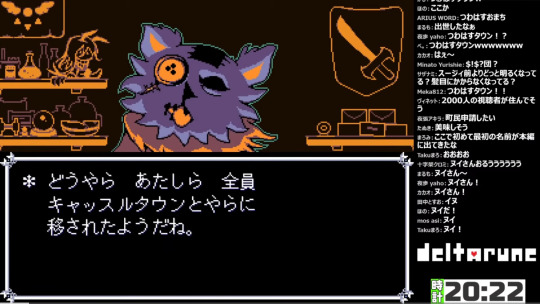
does the use of “atashi” combined with having a fem name confirm that they are female? i’m 95% sure the answer is no. do those two things lead native japanese speakers to believe that they are female? i have no idea.
light and dark world
skellfamily mentioned all of this in the post i linked, but i have something small to add
undertale uses mainly hiragana in its text for the japanese version, with some small exceptions for when the fourth wall is broken. this is referencing earthbound, which also did this. this carries over to the light world of deltarune, but kanji is used liberally in the dark world. this is explained by toby fox wanting the light world to make the player think deltarune would be like undertale.
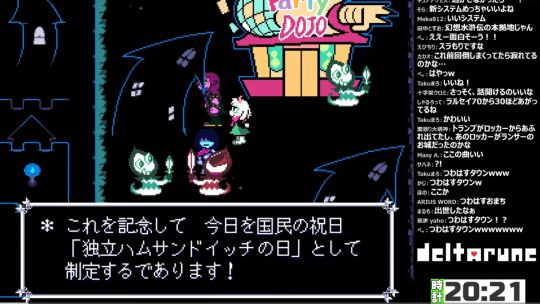
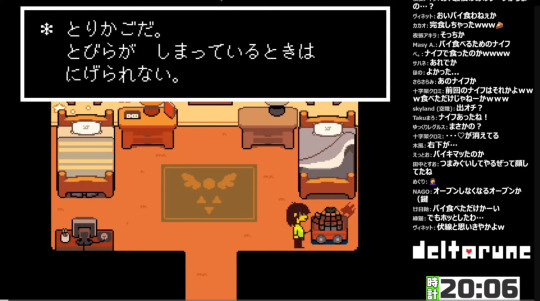
that’s all
small jokes and stuff in the localization
the “librarby” misspelling joke carries over, with it being named “toshonka” (the japanese word for library is “toshokan”).
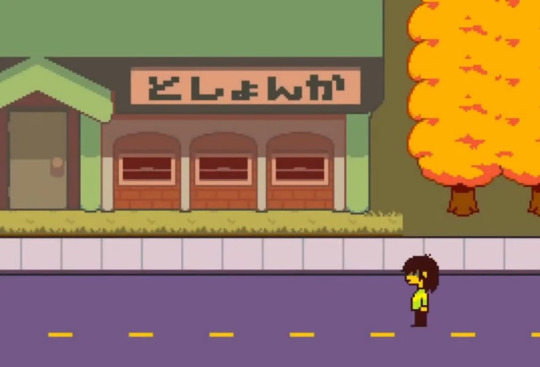
the AGREE2ALL puzzle was changed to say “YEEES20!!”. this can be read as “yes ni maru” (with the number 2 being read as “ni” in jp and “maru” being the word for a circle), meaning “yes to all” just like in english!
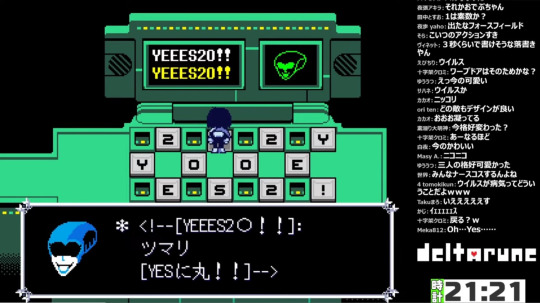
the “apple” keyboard puzzle still says “apple” though ralsei mentions that apple means “ringo” (the japanese word for apple) if you talk to him for a hint.
funnily enough, this joke was kept as is! (“kris, type as i say. f…” “…un!”)
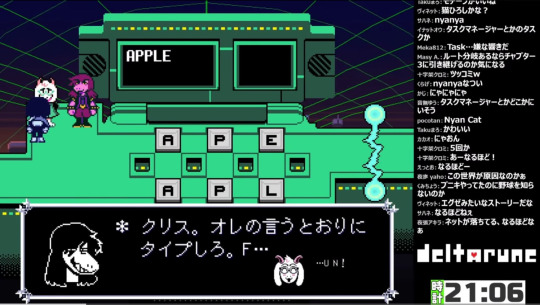
the tasque’s battle lines in english are binary codes, with “me” being 0 and “ow” being 1. this is similar in jp. “nyan” is the equivalent of “meow” in that language, so “ny”=0 and “an”=1. cute!
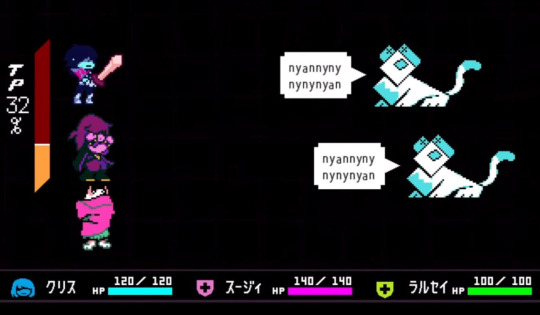
the “bosom” joke is about the same, if anyone was curious
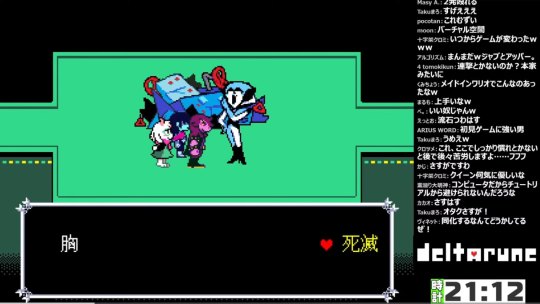
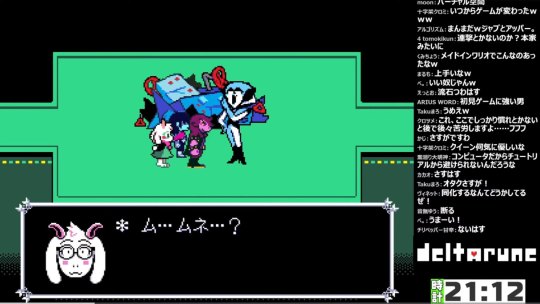
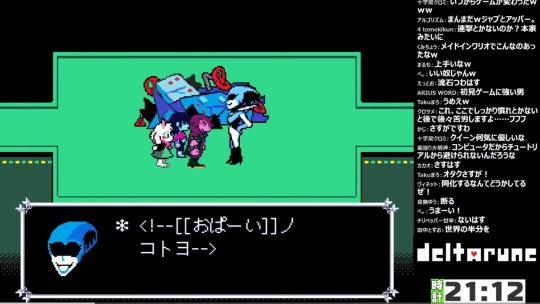
“breasts / annihilation”
“b…breast?”
“it means tity”
probably my favorite joke in the entire japanese version: in english, before the berdly fight on the roller coaster, he incorrectly refers to lightners as “Light Nerds” . in japanese this is changed to make him use ateji (a combination of kanji that doesn’t mean anything but sounds like an already existing word with their combined readings), calling the lightners 雷斗奈悪 (raitonaa, phonetically similar to the transliteration raitonā which the translation uses). it has the exact same effect (of berdly trying to sound smart but actually being very incorrect), but it’s localized in an outstanding way
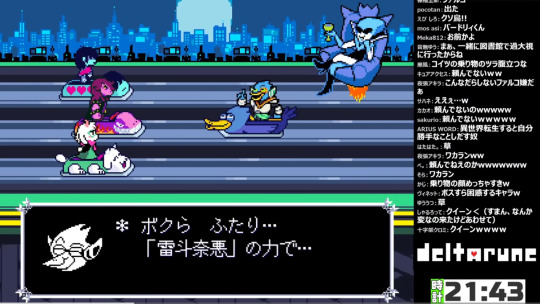
“you are filled with the power of not knowing what sugarplums are” is changed to “you are filled with the power of not knowing what christmas pudding is”.
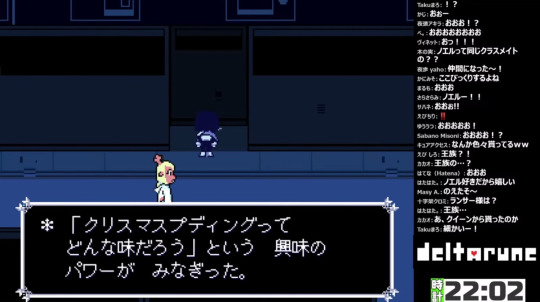
when berdly incorrectly calls susie “susan”, she says “who’s susan?” instead of “my name isn’t susan”. japanese people likely don’t know that “susie” is usually short for “susan”, so it makes sense for her to be even more confused in this version.
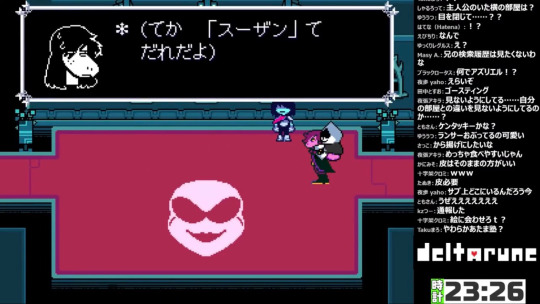
the spelling contest in berdly’s flashback is still an english spelling contest, with berdly specifying that it’s english.
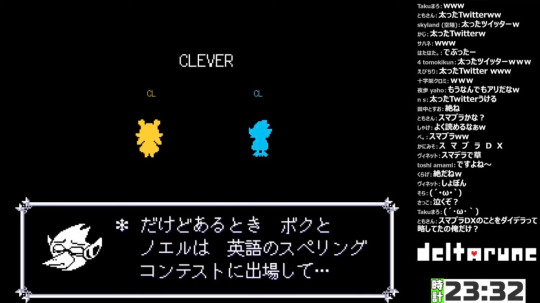
instead of saying “susie… a real dragon blazers reference?!” when susie references dragon blazers 2, berdly says, “susie… you’re… a serious dragon blazers player…?!”
on that topic, dragon blazers is instead called dragon blader in japanese. was it called that the whole time? am i misremembering? i legitimately don’t know
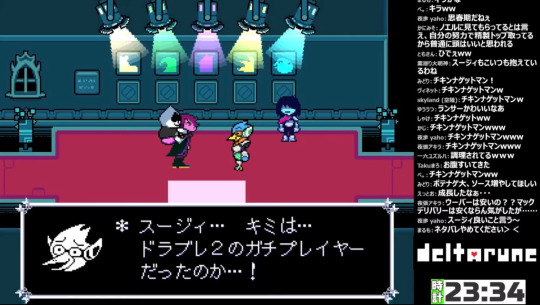
the ice-e keysmash puzzle is changed so that you can type it out in japanese as すふぎおろてにぺけなも. it still does not mean anything.
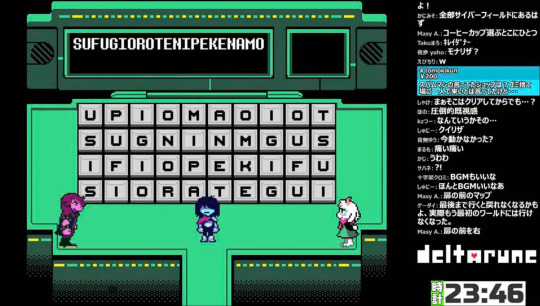
right after susie referenced godzilla with the susiezilla line on the ferris wheel, she references ANOTHER tokusatsu. i think. here (while about to fall on ralsei) she says “ore, sanjou!!!!” (i arrive!), which is a famous catchphrase from kamen rider den-o. i’m like 85% sure it was an intentional reference. den-o is one of my favorite rider shows so this is amazing to me
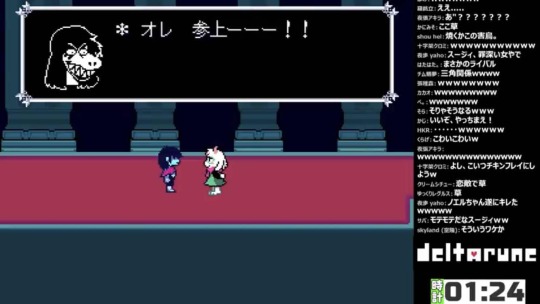
and lastly. the name of minecrap is changed to マインクシャット (mainkushatto), which seems to be a play on some word plus “minecraft” like in english. i’m not sure what the wordplay is. i’ll get back to you on this
lore-y important stuff
about dess
in japanese, the december typing puzzle still spells out “december” in english.
noelle refers to dess as “onee-chan” (older sis)— it’s common for japanese people to refer to their older siblings like this, and it would be extremely weird if noelle called her “dess”. she could have called her “dess-neechan” or some variation of that, but i highly doubt that the name “dess” is being obscured, especially because “dess” transliterated would sound extremely close, if not alike to “desu” as well as the transliteration of “death”.
the knight
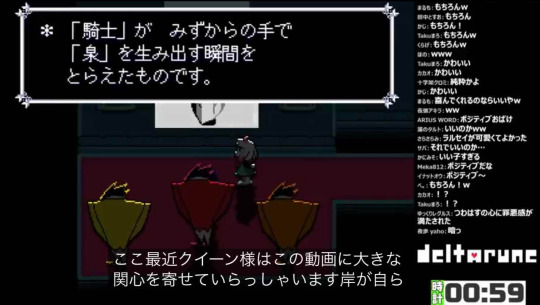
(i took the screenshot and forgot to turn auto captions off, sorry)
this line from a swatchling says something like “it captures the moment where the ‘knight’ creates a ‘fountain’ themself, with their own hands”, but the word for “themself” (みずから/mizukara) is written in hiragana, and “mizukara” could also technically be read as “from water”. was this a deliberate water-darkness parallel? i have no idea.
speaking of water!
the roaring knight is referred to as “咆哮の騎士” (houkou no kishi), the knight of the roaring. the word for the roaring itself, 咆哮, means roar or scream. which eliminates the alternate meaning of roaring (also being possibly defined as the sound of rushing water), but that probably doesn’t solidify “roaring” as solely meaning that. there are a lot of terms in undertale that had multiple meanings, but had to be changed to have only one in the japanese localization. “roaring” might be similar to those instances.
angel
spamton calls noelle an angel just like in english, referring to her as “angel-chan”. if there’s somehow anyone out there that didn’t think that line was important, i am here to prove you wrong!!!
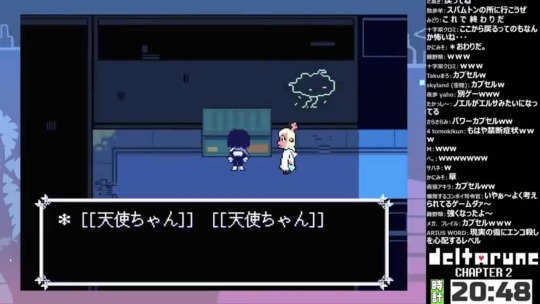
more interesting:
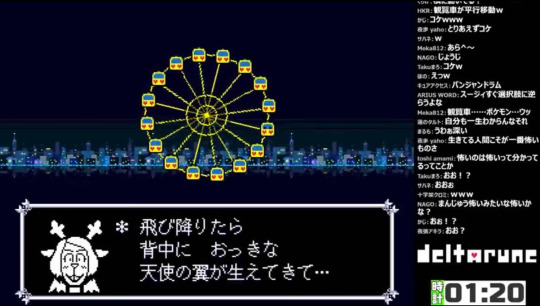
this is the line where noelle says that if this was a dream, she would grow wings and fly away— but in this version, she says “big angel wings” specifically. very interesting!
the two (2) other notable changes in weird route
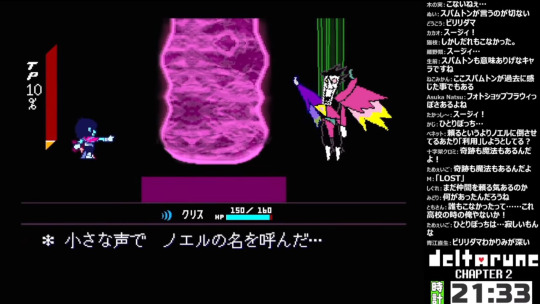
the infamous “you whispered noelle’s name…” line is slightly different. slightly.
the “kris called for help” lines still say that kris is the one doing it, but this one does not say the subject at all. this is normal for japanese, regardless, it’s still very interesting that it doesn’t say “you”. it is still differentiated from the “kris” lines, but not specifically referring to you (the player).
the other difference is so minor that i’m not even sure what it is or if it’s different from the english version.
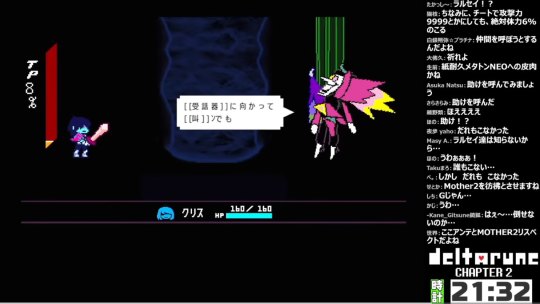
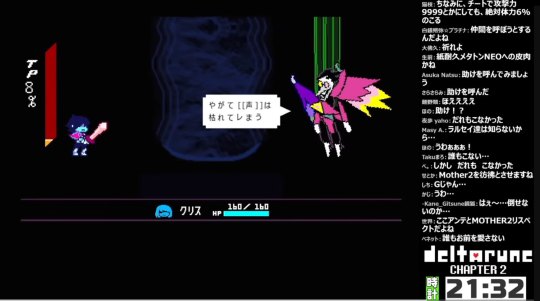
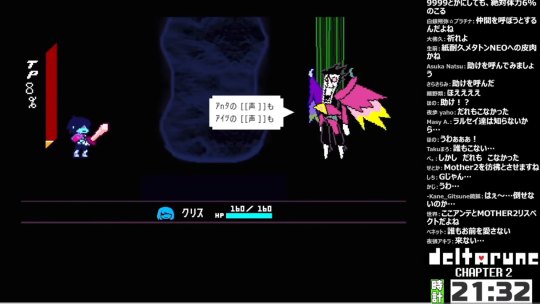
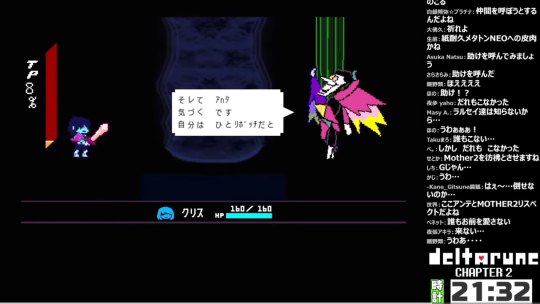
translation
EVEN IF YOU [Shout] AT THE [Receiver]
YOUR [Voice] WILL EVENTUALLY WITHER
YOUR [Voice]
THEIR [Voice]
AND YOU WILL realize you’re alone.
i do not know who “THEY” is that spamton’s referring to. the term he uses is gender-neutral and singular. is he talking about the player? idfk probably not
miscellaneous spamton-related stuff
spamton’s speech patterns are entirely different in the japanese translation, but they get the same message across. they include:
switching between formal and informal language
using weird mixtures of hiragana, katakana, english letters and kanji
using katakana re (レ) instead of hiragana shi (し)
cutting off words
random spacing
and occasionally using “die” and “death” as homophones for “dai” and “desu”
it’s so wacky and unnerving and strange, i love it :D
other spamton lore bits:
mike’s name is the same (マイク maiku). i somehow forgot to translate the mike-related dialogue. i will get back to you all if there’s anything of note.
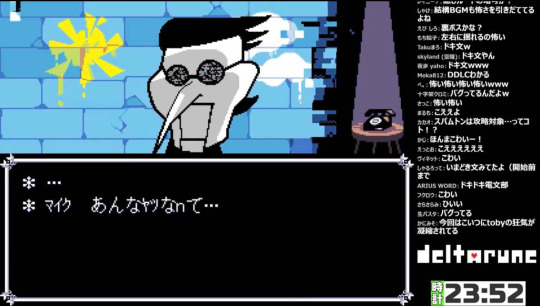
the word for “garbage noise” is 雑音, with about the same meaning. unsurprisingly, the same word (the exact same phrase, in fact) is used for both the addison’s line and the gaster phone call line.
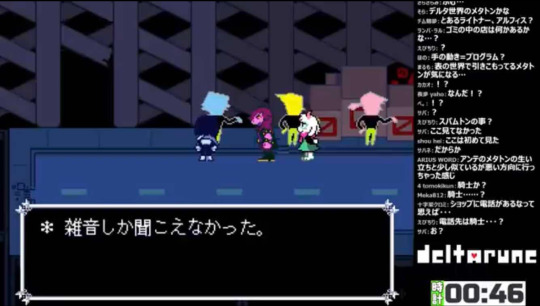
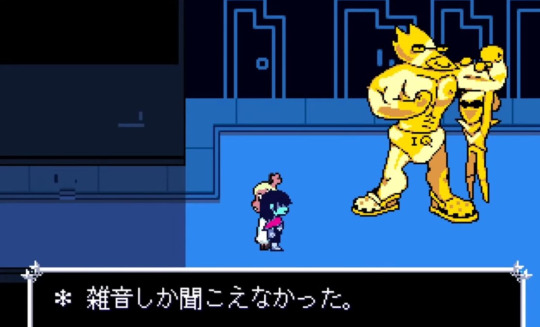
the last thing (i think)
in the roaring cutscene, the japanese word for “chaos” is said (in the “all will be plunged into chaos” line), but then says the transliterated version of the word (カオス) in parentheses. tsuwahasu noted that it’s “keyword-like” in the playthrough i watched. is this important? i have no idea
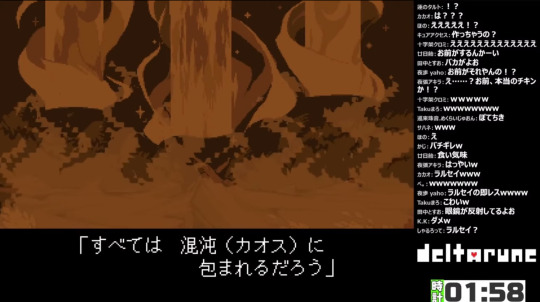
i’m sure there are things that i missed here, so (again) if you want to know about something, don’t be afraid to ask!! the jp version of deltarune should be looked at a lot more—not just for the lesser-known lore tidbits, but also for the cool stuff that was changed to fit the language. it’s a really cool localization!
#deltarune#utdr#deltarune chapter 2#japanese#op#spamton#snowgrave#noelle holiday#kamen rider den-o#(<- i promise there’s a reason for tagging this)#translation
275 notes
·
View notes
Text
terms of address: maruki
I was asked how the squad refer to Maruki, so here goes.
first, the normies
Many of the cast refer to Maruki exclusively as "Dr. Maruki": 丸喜先生 Maruki-sensei. These mentions are universally in kanji.
Ann has 41 of these, and often uses sensei by itself;
Haru has 26 of these, and uses sensei alone a couple of times, during Maruki's Palace;
Makoto has 27 of these. She uses sensei alone quite often;
Yoshizawa has 41 of these total, 14 as Kasumi and 27 as Sumire. She calls Maruki just sensei often.
Noticing anything? Yeah: they're all the girls. These particular characters consistently seem to have relatively colourless and unmarked speech. This may in itself, of course, be a form of marking, since expectations around gendered speech in Japan can be so strong.
the relatively boring
Ren appears to always use "Maruki", apart from one instance very early on when an option, "Ask about the counsellor", includes Maruki-sensei. He also always uses kanji; protagonists don't have to be polite.
He calls Maruki sensei alone once, during his confidant. Kawakami gets it more often, while Takemi gets it constantly.
slightly more edgy
While Futaba always uses "Dr. Maruki", she slurs it a little, making it slangier: 丸喜せんせー Maruki-sensee. She always uses kanji for "Maruki", except in the text chat after he visits Shujin, where she's only heard his name spoken!—which is a cute detail. Occasionally she uses せんせー sensee by itself, which is distinct from her 先生 sensei meaning "a teacher".
Ryuji, again, virtually always makes it "Dr. Maruki", usually Maruki-sensei in kanji; a few mentions very early on, when they're still talking about the new counsellor guy, are just straight "Maruki". Also, in his counselling session, Ryuji almost just calls him that!—ultimately deciding to make it "Dr. Maruki":
Ryuji
なあ、丸喜⋯センセーってよ、よく『変わってる』って言われね?
naa, maruki... sensee tte yo, yoku "kawatteru" tte iwarene?
Hey, Dr. Maru— ah, I mean, Doc. Anyone ever tell you you're kinda… not normal?
The meaning is a little lost in translation here, with Ryuji cutting from the normal form of address to a nickname. Also, in Maruki's Palace, he recognises Maruki on one of the videotapes, and starts off in hiragana before finishing in kanji. It feels a bit as if he isn't initially sure what he's seeing:
Ryuji
まるき… 丸喜先生?
maruki... maruki-sensei?
Maruki... Dr. Maruki?
He uses sensei by itself a couple of times, far fewer than you might expect; his "Doc" is usually either glossed in, or was originally Maruki-sensei, "Dr. Maruki".
He also uses 大先生 daisensei, "great leader/teacher/artist" etc, as a term of abuse, aimed at palace bosses such as Shido and Madarame. 獅童大先生 shidou-daisensei—"that stuck-up bastard Shido!".
the slightly outlandish...
Morgana overwhelmingly uses katakana for names, and Maruki is no exception. He talks about him a lot, always in katakana, as マルキ Maruki. He never uses any honorifics for him.
He has only one use of kanji, 丸喜 Maruki, in "will you meet with this confidant?" text, around I think rank 5, which looks like it may be a slip.
the strangely polite...
Akechi, of course, fails to grace Maruki with his title of "doctor"; he's just plain "Maruki". The localisation sometimes makes it "Dr. Maruki", but that's a gloss; Akechi never once uses sensei (or any other honorific) about him.
But he uses an honorific to Maruki, once:
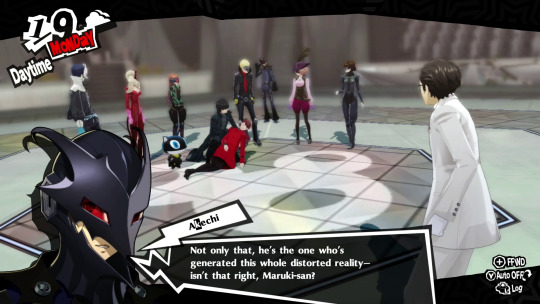
That "isn't that right" is ですよね desu yo ne, which might seem startlingly polite for third semester Akechi. In fact, he's rather consistent about his masu forms to Maruki—and only to Maruki—during the third semester.
He has no uses of desu or -masu/-masen, for instance, to anyone else in the third semester. It's actually rather cute, because it makes it clear a number of his lines in the 1/2 and 1/9 Palace are directed not to Ren or Yoshizawa, as it might seem, but to Maruki.
So this looks like a sardonic little aside, and I'm sure there's a lot of that in it—"Maruki-san". But this is also the only time Akechi ever addresses Maruki by name. And since he has all these desu and -masu forms going on around Maruki, then maybe he just calls him Maruki-san, full stop.
Did I mention he's a weird boy?
...and the downright weird
That leaves us with Yusuke, who (as nobody will be surprised to hear) does his own thing that raises some fascinating possibilities.
Yusuke only appears to address Maruki by name once, when they first meet in the courtyard, and as you'd expect, he calls him sensei—丸喜拓人先生 Maruki Takuto-sensei, "You are Dr. Takuto Maruki, correct?".
But every other time Yusuke uses sensei in the script? He's referring not to Maruki, of course, but to his sensei, Madarame. That initial approach to Maruki, stranger to stranger, face to face, is the only time he uses it to anyone else.
So what does Yusuke call Maruki? He calls him 丸喜氏 Maruki-shi.
what is shi
氏 shi is a very formal and exclusively third-person term, usually seen in writing, or heard from newsreaders. It's often translated "Mr X", which can be very odd to hear in media that retains honorifics like -san and -kun; "Mr. Akechi's coming on!" is an example, from 6/10. And Akechi is, in fact, usually mentioned as Akechi-shi on the evening news.
Yusuke's Maruki-shi is universally translated as "Dr. Maruki", as if he'd just said Maruki-sensei like everyone else. Which is a little bit of a shame.
Yusuke also uses shi for one other person—the art patron Kawanabe, in his confidant, before you meet up at the sushi bar. Most of the rest of the time, before and after, Yusuke just calls Kawanabe "Kawanabe" in third-person, with no title; he pulls out a Kawanabe-san at rank 10, after he's won the contest—face to face, of course, since shi is only third-person.
On the other hand, Yusuke never mentions Maruki at all without a title.
the other time yusuke uses sensei
Okay, I lied: Yusuke has one other instance of Maruki-sensei. This, like Morgana's single lapse into kanji, is in prompt text: "Are we going to Maruki's Palace today?" Again, I think this is likely an error.
revision history
Click here for the latest version.
v1.0 (2023/12/29)—first posted.
#persona 5#p5 meta#p5 reference#japanese language#p5 terms of address#takuto maruki#yusuke kitagawa#goro akechi#ryuji sakamoto#the squad
480 notes
·
View notes
Note
Did you ever figure out what's Snape's pronoun in japanese? 👀 I'm curious
I have jumped through so many hoops...
I want to buy the hardcovers in Japanese, so I didn't want to spend money just to check a word... but piracy is hard for Japanese things...
So I've signed up for an Amazon kindle unlimited thingy account
and Amazon is useless in my country nobody has a fucking amazon account
AND THEN to read it I have to download the KINDLE APP on on my PC and log into AMAZON on it uuugh whinge whinge complain tantrum
I got all the japanese books - and I've been tipped off that he might use 'Wagahai' and FUCK do I hope he uses wagahai but it seems I cannot use the search function with kanji. Nor does it seem to search through furigana. Only hiragana and katakana. uuuugghhhhhh
So I just need to... search for Snapes name in every book and scour the pages. Cool. Cool.
So I am looking through each book's every mention of スネイプ...
Dumbledore uses 'Washi' and is, as always, delightful - using the typical old man 'jya's. I hope he and Sebarusu enjoyed their umasou custard tarts. Shoutout to Suneipu's poisonous eyes at Hari- and Ron.
「ミネルバ、わしは歓迎会のほうに戻らんと。二言、三言、話さねばならんのでな。さあ行こうかの、セブルス。うまそうなカスタード・タルトがあるんじゃ。わしゃ、あれを一口食べてみたい」 しぶしぶ、自分の部屋から連れ去られるように出ていきながら、スネイプは、ハリーとロンを毒々しい目つきで見た。
秘密の部屋 (p. 124)
How come "さあ行こうかの、セブルス。うまそうなカスタード・タルトがあるんじゃ。わしゃ、あれを一口食べてみたい" sounds so much cuter in Japanese
I got ONE 'Watashi' - but I'm not satisfied with it. It's in a note written for Slytherin to train their new seeker. "I, Professor Snape,"
『私、スネイプ教授は、本日クィディッチ・ピッチにおいて、新人シーカーを教育する必要があるため、スリザリン・チームが練習することを許可する』
秘密の部屋 (p. 167)
But a note is formal. What does he call himself casually...?
「校長、一言よろしいですかな」 影の中からスネイプの声がした。ハリーの不吉感がつのった。
秘密の部屋 (p. 218) ("Headmaster, May I have a word." From within shadows came Snape's voice. Harry's sense of foreboding increased.) Unrelated - just iconic af.
BUT I FOUND IT!!!!
スネイプはますます底意地の悪い笑いを浮かべた。 「校長、ポッターが真っ正直に話しているとは言えないですな。すべてを正直に話してくれる気になるまで、彼の権利を一部取り上げるのがよろしいかと存じます。我輩としては、彼が告白するまで、グリフィンドールのクィディッチ・チームから外すのが適当かと思いますが」
秘密の部屋 (p. 219)
HE USES WAGAHAI!!! He is SO cat themed in Japanese, what the hell... English its always bats and spiders, Japan is straight up like 'He purrs and is a cat'
...
For people who don't know: Wagahai is an old-timey male pronoun.
It's long been out of use and sounds arrogant, pompous, formal...
"I'm better than you. I look down on you. You're a peasant; I'm a Lord."
It re-gained popularity within fiction because of the 1905 book about a teachers pet cat by Natsume Souseki, 吾輩は猫である (I am a cat).
It is STRONGLY associated with that book and cats in general.
It's almost always used for non-human characters, especially to give an 'old military man' or 'from a different time' feel.
#severus snape#hp#albus dumbledore#japanese hp#wagahai#SNAPE IS A CAT IN JAPANESE#REJOICE ALL YE WHO LIKE CATS LIKE... ALOT#I see you drawing him with cat years or as one of those real weird lookin cats - you are justified.
103 notes
·
View notes
Text
THE ORIGIN OF THE WORD "BAKA" IN JAPANESE
Baka (Hiragana: ばか, Katakana: バカ) is a fairly common swear word in Japanese that means "idiot" or "fool". However, baka can also have many other meanings depending on the context.
1️⃣ The Origin of the Word "baka"
When written in Kanji, baka is often represented by the two characters "馬鹿", where "馬 - uma" (horse) means horse and "鹿 - shika" (deer) means deer.
There is a theory that the word baka (馬鹿) is derived from the phrase "指鹿為馬 - shiroku vi ma" (pointing to a deer and calling it a horse), which has its origins in a Chinese anecdote.
During the reign of Qin Er Shi, there was a chancellor named Zhao Gao who wanted to seize power but was afraid that the courtiers would not obey him, so he devised a plan to test their loyalty. Zhao Gao presented the emperor with a deer and declared that it was a horse.
Er Shi said that it was a deer, but many courtiers in the court followed Zhao Gao and said it was a horse, only a few dared to tell the truth. Later, those who spoke the truth were targeted for revenge by Zhao Gao. The idiom "pointing to a deer and calling it a horse" therefore refers to the act of twisting the truth, telling lies or making mistakes, and not being able to distinguish between right and wrong.
2️⃣ Other Meanings of Baka (ばか) in Japanese
Baka: stupid (the nuance changes depending on the region) In Tokyo, baka is "idiot, fool" with a lighthearted, affectionate nuance. In Kanto in general, baka is often used to tease or mock someone in a lighthearted way. However, baka has a rather negative meaning in the Kansai region and is usually only used when swearing or insulting someone.
Baka: fanatic - many people are proud to be a "baka" Baka when combined with certain nouns can be used to refer to people who are fanatic, passionate or obsessed with something. Therefore, there are some Japanese people who proudly call themselves "baka", implying that they are a fan of something.
Examples: ・野球バカ (yakyu baka): baseball fanatic. ・戦闘ばか (sentou Baka): hot-headed, likes to fight.
Baka: very, too much, a lot Baka is also used to express the meaning of "excessively unreasonable, incredibly stupid".
Examples: ・馬鹿デカイ(bakadekai): huge, incredibly large, unbelievably large ・馬鹿高い (baka dakai): super expensive, extremely expensive
3️⃣ Common baka phrases in Japanese
・馬鹿野郎 (baka yarou): idiot, fool.
・超馬鹿 (chou baka): the word "超" (super), so "chou baka" can be translated as super stupid, incredibly stupid.
・大馬鹿 (oobaka): big fool, big idiot, extremely stupid
・大馬鹿野郎 (oobaka yarou): big idiot, big fool
・馬鹿馬鹿しい (bakabakashii): something "meaningless"
111 notes
·
View notes
Note
what do each of the main PMMM girls names mean?
Here's that info in one handy-dandy post:
Madoka Kaname:
Madoka: Written in hiragana, so there's no way to know for sure. But a popular interpretation for her name is that it should contain the kanji for "round" or "circle," referencing her role as the Law of Cycles. It could also be written with the character for "wish" or "ambition," the connotations of which should be obvious.
Kaname: The characters mean "deer" (鹿) and "eye"(目), respectively.
Homura Akemi:
Homura: Like Madoka, it's written in hiragana which has no special meaning. However, in the show itself Madoka takes it to mean "flame" so that's what the fandom has gone with.
Akemi: The first character (暁) means "daybreak," while the second one (美) means beauty.
Mami Tomoe:
Mami: It's written in katakana and has hundreds of potential meanings when we take all the potential kanji into account. I'm really not aware of the fandom's popular take on the meaning of her name. However, she may be named after another magical girl, Creamy Mami.
Tomoe: The character for her last name (巴) literally means "comma design," a Japanese swirl pattern. She may be named after Sailor Saturn (Hotaru Tomoe), a fellow magical girl.
Sayaka Miki:
Sayaka: Her name is written in hiragana- noticing a trend? Some of the potential meanings of "Sayaka" are "clear," "fresh," and "bright."
Miki: The first character (美) means "beauty." The last character (樹) means "tree."
Kyoko Sakura:
Kyoko: Finally we have an exact meaning! Kyoko's given name is in kanji and means "apricot."
Sakura: Even casual anime fans should know this one: it means "cherry blossom."
Bonus round: Nagisa Momoe
Nagisa: Aaaaaand we're back to hiragana. Some potential meanings of Nagisa are "beach, shore."
Momoe: The first character for Momoe (百) means "hundred", but also carries the connotation of "a lot of things". The second character (江) means "inlet" or "bay." "Momoe" could be translated as "a hundred rivers."
Thanks a bunch to the PMMM Wiki for providing etymology for every single PMMM character, including all spinoffs! Or at least for every magical girl character, which to be real are the only characters who matter.
#pmmm#madoka magica#puella magi madoka magica#madoka kaname#homura akemi#mami tomoe#sayaka miki#kyoko sakura#etymology#name meanings
294 notes
·
View notes
Text
Guide to Understanding Genocider’s Many Names
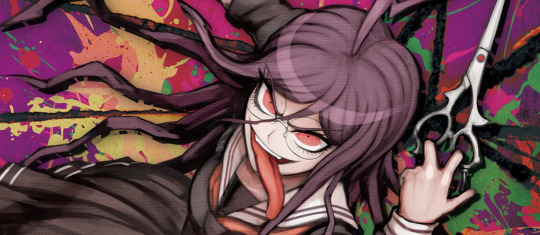
Genocide Jack has many names and it can be hard to understand why so many people use different ones or spell them differently, so I attempted to make a guide that is as comprehensible as possible.
Something to know before hand
Kanji: More complicated, such as 翔
Hiragana: Simple and smooth, such as しょう
Katakana: Simple and sharp, such as ショウ
Let’s get the “Genocide” part out of the way
This part of her name is written in katakana, (ジェノサイダー) and you’ll notice the line at the end. This means the sound is extended, so instead of “da” it’s “dā”. Japanese doesn’t have an “er” so this is used instead, since they sound similar. Her official title is Genocider. The localization simply switched this is be Genocide. I’m not sure why, maybe since Genocider isn’t actually a word, but that’s just my best guess.
Syo VS Sho
Here’s where it get complicated.
In order to make sounds like “kyo”, “bya”, or “ju”, two hiragana are need. First, a character ending in i, such as ki, bi, or ji, characters pronounced like ka or bu cannot be used. Second, one of the three y’s (ya, yo, or yu) in a smaller form.
The character “ki” (き), combined with “yo” (よ), would make “kiyo”. But if the “yo” is written smaller (よ→ょ) then the “i” from the first hiragana is replaced by it. So since きよ is Kiyo, きょ is Kyo. Same for “bya”. びや is Biya, so びゃ is Bya.
Now, we have our “exceptions”, shi (し) and ji (じ). You’ll notice they look very similar, which is why they are both “exceptions”. For “ji” (じ) and “yu”, (ゆ) rather than jyu it’s just ju (じゅ). It’s different since in the case of kyo and ko, it’s a whole other sound, but jyu and ju are pronounced the same, so the y isn’t needed.
But in all my examples, you’ll notice the first hiragana is two letters, which is why it gets tricky for “shi”. Like jyu, shyo is unnecessary, however, h and y are pronounced the same here, so you can remove either one and get the same sound.
Quick Note: I used “kyo”, “bya”, and “ju” as examples since there are Danganronpa characters with those in their names, but, just to clarify, they aren’t the only combinations possible.
The reason I put exceptions in quotes is because this is romanization, there is no rule book saying you must write it this way. While Sho is the most common way to write this, it doesn’t mean Syo is wrong. In fact, the games themselves use this.
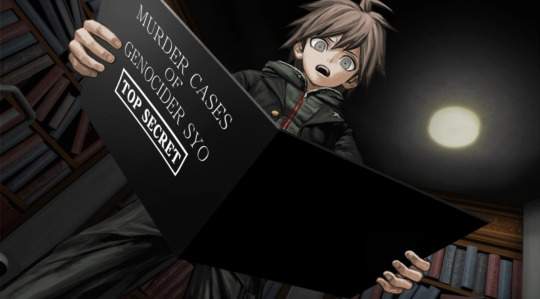
However, they also use Sho.

So, really, both are correct.
Syou VS Syo / Shou Vs Sho
> I’ll be calling her Sho/Shou here for convenience.
翔 should be spelt with a “u”, since it’s しょ“sho” then う “u”, so “shou”. Still, a lot of times the u is excluded because it doesn’t sound too different in English. English speakers pronounce “Shuuichi” and “Shuichi” the same, so I suppose the u is unnecessary. You’ll find this is common in a lot of different translations. Even Japanese media that use the alphabet, like the pictures above, will sometimes leave out the u, if following an o or another u.
Jack & Jill
These are just the titles that are strictly English. Since the whole thing about Syo in the beginning was that she’s a serial killer, society will assume it’s a man, so the public will give her a masculine name. In English, people will hear Sho and see it’s foreign, so there’s no gender association. I think it was changed that way so we’d see it as masculine. While I think they should’ve kept her Japanese name like everyone else in the game, I cannot deny how easily Genocide Jack rolls off the tongue.
Overall
All the names work, use whatever you want.
I hope this made sense to at least one person. If it doesn’t, feel free to ask for further clarification!
#danganronpa#genocide jack#genocider syo#genocide jill#genocider sho#praying I didn’t misspell anything
82 notes
·
View notes
Text
The different versions of "Yuri"
There are two versions of the Japanese name "Yuri" and I wrote a short guide how to distinguish them:
The female Yuri (百合) translates as "lily". It's a fairly common name in Japan. In Japan, white lilies haven been symbolising the beauty and purity in women for centuries, and because of this it eventually became the term to describe sapphic fiction, especially in manga and anime.
The male 勇利 is fairly different in meaning and writing. The first kanji 利 ("yuu") translates as courage, the second one 利 ("ri") as advantage--attributes that traditionally haven been associated with men and match Yuuri's personality nicely. Likewise, many female names are derived from terms that describe beauty, gentleness, and other traditional "female" virtues, and not only in Japanese culture but also other cultures (thanks for nothing, patriarchy).
Yes, you read that right: the creators didn't give Yuuri a woman's name.
The pronunciation for each name is different as well. Whereas 百合 has a short first vowel, the first vowel in 勇利 is drawn out. This becomes obvious when both names are written in hiragana:
百合 -> ゆり (yu-ri)
勇利 -> ゆうり(yu-u-ri)
That's why "Yuuri" has established itself as the preferred spelling of our beloved katsudon's name in the fandom. (Another valid spelling would be Yūri.)
In katakana, these names are:
ユリ
ユーリ
The second one looks familiar, right?
To sum this up, we have
勇利 ≠ 百合
and in romaji:
Yuuri ≠ Yuri
With this in mind, watching the show with English subs becomes a bit jarring, especially as you can hear the characters drawing out the first vowel in "Yuuri".
There are a few more combinations of kanji forming both names, with different meanings. If you're interested in that, you can look them up on Wikipedia.
Bonus: What about Yurio's given name?
The Russian (male) name Yuri (Юрий) derives from the Old Greek Georgios (Γεώργιος), which means farmer, or literally, "he who works the earth". Yuri and its variants are popular in Slavic countries, while in Western Europe and English-speaking countries worldwide Georg/George is more common.
So, yeah, we have three different "Yuris" with different meanings and spellings.
Thanks for coming to my TED talk! Hope this helps!
171 notes
·
View notes
Text
Japanese Language and World-building in Ascendance of a Bookworm
I decided to make this post because a conversation with @mesaprotector made me realize that readers experiencing Ascendance of a Bookworm in English (through Quof’s admittedly excellent translations) might not be aware of Kazuki-sensei’s extensive use of Japanese linguistic features in shaping the world and its characters.
Disclaimer: I don’t have any particular credentials that make me an expert in this area. All I can boast is good enough Japanese language skills to notice these features! But, if you’re interested in my explanation, read on...
About Japanese
Japanese is a language that allows people to easily express their relationship to others through their choice of words. This is likely rooted in Japan’s feudal past, when social roles were much more strictly defined and enforced. Some features that allow this are:
Masculine vs. Feminine Speech: Men and women can (and often still do) use completely different vocabulary as a form of gender expression.
Use of Different Titles: Most manga and anime fans are familiar with titles like -san and -sama used to refer to others politely. Not using a title for someone is also a way to express your perceived relationship to them.
Polite vs. Informal Speech: You use polite speech when speaking to people you perceive as being of a higher social ranking than you, or people you are not close enough to use informal speech with. There are varying levels of politeness. For example, “aru” is casual, “arimasu” is polite, and “gozaimasu” is ultra-super-polite.
Pronouns in Ascendance of a Bookworm
I (first person singular pronoun)
Commoner women, like Tuuli and Effa, use わたし(watashi, written in hiragana) to say I. Commoner men, like Gunther, use オレ(ore, written in katakana) to say I.
Noble women, like Florencia and Elvira, use わたくし(watakushi, written in hiragana) to say I. Noble men, like Damuel and Sylvester, use 私 (watashi, written in kanji) to say I.
There are some commoner women who exclusively use “watakushi,” like noble women do. Frieda does, and so do all of the gray shrine maidens in the temple. Similarly, the gray priests in the temple use “watashi” instead of “ore.”
Well-trained commoner men who are interacting with nobles (e.g. - Benno when he gets fancified) will switch to “watashi” as well.
Even after becoming a noble and referring to herself as “watakushi” when speaking, Myne still calls herself “watashi” in her inner monologue. This is not the case for other women who have been trained to use “watakushi” since birth, so it’s a sign that Myne's inner self is unchanged despite the new, noble veneer.
You (second person singular pronoun)
Commoner women almost never use any version of the pronoun “you.” Instead, they will call a person by their name, either with or without a title depending on their relationship to that person, or by a title only. Commoner men use おまえ(omae, written in hiragana) to say “you.”
Noble women also will usually refer to others by their name, though when they do use a pronoun, they use 貴方/貴女 (anata, either in masculine or feminine form depending on the gender of the person they are addressing, written in kanji). Noble men use 其方 (sonata, written in kanji) when speaking to people of equal or lower rank and 貴方/貴女 when speaking to those of a higher rank.
And then we have 君 (kimi, written in kanji), which I have only seen Ferdinand use, though I believe other men in the temple use it when referring to someone of a lower rank than they are (e.g., the former High Bishop Bezewanst uses it to refer to Myne in the anime, so I’m guessing he used it in the LN as well, though I have not read part 1 in Japanese). Ferdinand normally uses “anata” and “sonata” like any noble man--except when speaking to Rozemyne, who he calls “kimi.” It’s a regular reminder that their relationship began in the temple, not in noble society, and that he feels differently toward her than he does toward any other noble.
Titles in Ascendance of a Bookworm
No Title
This is used among commoners to indicate someone with whom the speaker has a close relationship. For example, Lutz just calls Myne “Myne” with no title attached. Among nobles, it is used when referring to someone of lower rank. For example, Sylvester calls Ferdinand just “Ferdinand” because he is his younger brother and a lower-ranking noble than Sylvester. Noble men will also use it to refer to those of equal rank, and retainers serving the same lord or lady use it regardless of rank to facilitate quick communication.
-san (-さん)
This title only gets used within commoner society. It indicates distance in relationship between the two people interacting as well as a desire to speak politely. For example, Myne calls Benno “Benno-san” until she becomes a noble. Afterward, she drops the title to indicate that he is of a lower rank than she is, except when they are in the hidden room together and she reverts to her commoner speech patterns.
-sama (-様)
This title is used by commoners when speaking to nobles. It is also used by nobles. Noble men use it when referring to someone of a higher rank than they are. Noble women use it when referring to someone of higher or equal rank to themselves, including their husbands. For example, Cornelius calls Rozemyne “Rozemyne-sama” when he is on the job as her retainer, but when they are speaking as siblings, he just calls her “Rozemyne” because she is his younger sister and therefore lower in the family hierarchy. Rozemyne and Hannelore always refer to one another as “Rozemyne-sama” and “Hannelore-sama” despite their close friendship and equal rank. Eglantine refers to Anastasius as “Anastasius-sama” both before and after they are married.
Family Titles
These are used among both commoners and nobles, though they use different ones. Myne refers to Gunther as 父さん (tou-san, written in a combo of kanji and hiragana) and Effa as 母さん (kaa-san, written in a combo of kanji and hiragana). Lutz refers to them as Gunther-ojisan (Uncle Gunther) and Effa-obasan (Aunt Effa). Myne and Tuuli refer to one another with their names only, no family titles required, indicating that commoners are more relaxed about the hierarchy among siblings.
In noble society, different titles are used by men and women. Noble men use the following:
Father = 父上 (chichi-ue, written in kanji) and Mother = 母上 (haha-ue, written in kanji)
Older Brother = 兄上 (ani-ue, written in kanji) and Older Sister = 姉上 (ane-ue, written in kanji)
Uncle = 叔父上 (oji-ue) and Aunt = 叔母上 (obaue)
Grandfather = お祖父上 (ojii-ue, written in a combo of hiragana and kanji) and Grandmother = お祖母上 (obaa-ue, written in a combo of hiragana and katakana)
Noble women use:
Father = お父様 (otou-sama, combo of hiragana and kanji) and Mother = お母様 (okaa-sama, hiragana and kanji)
Older Brother = お兄様 (onii-sama, hiragana and kanji) and Older Sister = お姉様 (onee-sama, hiragana and kanji)
Uncle = 叔父様 (oji-sama, kanji) and Aunt = 叔母様 (oba-sama, kanji)
Grandfather = お祖父様 (ojii-sama, hiragana and kanji) and Grandmother = お祖母様 (obaa-sama, hiragana and kanji).
Myne also uses yet another set of family titles to refer to her adoptive family! Sylvester is 養父様 (tou-sama, literally “adoptive father-sama,” written in kanji) and Florencia is 養母様 (kaa-sama, literally “adoptive mother-sama,” written in kanji). She also often calls her older brothers by their names with nii-sama attached, such as Wilfried-nii-sama, as opposed to just by onii-sama. This is probably to distinguish among her multiple older brothers.
Other Titles
A variety of other titles get used in place of calling people by their name or pronouns, both in commoner and noble society. For example, Mark exclusively refers to Benno as 旦那様 (danna-sama, kanji), a title that Lutz begins calling Benno as well once he begins working for him.
Myne refers to Ferdinand as 神官長 (shinkancho, “High Priest,” kanji) almost exclusively until she becomes a noble. Then she refers to him as Ferdinand-sama when they are outside the temple but still shinkancho when they are in the temple, up until he stops being the High Priest (;_;). She also usually drops the -sama when referring to him in her inner monologue, further indication that while she can walk the noble walk, she doesn’t really believe in the hierarchy.
Professors of the royal academy get called -sensei. Giebes, Aubs, and the Zent also get called by their titles sometimes in place of their names, sometimes in addition to their names.
Formal vs. Informal Registers in AoAB
I’m not going to list every single word that is different between different registers here because that would be way too long. However, I’ll give some examples.
Commoners generally speak in an informal register all the time, unless they have been trained to speak politely to people of higher-rank. They use contractions such as -って (-tte, written in hiragana) to mean “said,” and they also often drop the ends of sentences entirely. When they do use verbs, they use the simple dictionary form, e.g. - aru instead of arimasu. Male commoners will often use interjections such as “na” or “ze” or “zo,” which makes their speech sound manlier and rougher. They also tend to use “da” instead of “desu.”
Any commoner who has been trained to use polite language will tend to use the politest forms when speaking to nobles, e.g. - gozaimasu instead of arimasu.
Nobles in general will use politer forms of verbs except in very private, relaxed situations. For example, 参ります (mairimasu, kanji and hiragana) instead of 来る (kuru) or おっしゃる (ossharu, hiragana) instead of 言う (iu, kanji and hiragana).
Noble women have extremely restricted speech patterns. They always speak in the polite or politest registers. For example, a noble woman speaking to a social equal or inferior might use “arimasu,” but when speaking to a social superior, she will use “gozaimasu” or “irasshaimasu.” They also say えぇ(ee, hiragana) to say “yes” instead of the more familiar “hai.” Noble men will use あぁ (aa, hiragana) to say “yes.”
Noble men have a little more freedom in their forms of speech. Many will use informal masculine speech when speaking to social equals or inferiors while still using slightly different vocabulary choice. For example, Ferdinand often says 解せぬ (gesenu, kanji and hiragana) instead of 知らない (shiranai) to say “I don’t know.” They will switch to the polite (but not necessarily politest) forms when speaking to someone slightly above them in rank and reserve the politest forms for those very high above them. However, some men will choose to use polite language all the time, even when speaking to social inferiors.
This is especially notable in the speech patterns of Anastasius vs. Sigiswald. Anastasius chooses to use more stripped-down, rougher language when speaking to social inferiors, whereas Sigiswald still uses “anata” and -masu endings when speaking to social inferiors such as Adolphine and Rozemyne. It demonstrates a stark difference between the two princes’ personalities and how they wish to present themselves to the world.
Another notable use of informal vs. formal is when Myne is in a hidden room with someone who knows of her commoner past. She’ll revert to how she spoke as a commoner. My favorite instance of this is in Part 4 volume 8 when she and Ferdinand are in his hidden room just after she learned he is leaving. As she grows more and more emotional with her threats, she loses the ability to speak in noble speech patterns and starts speaking to him the same way she would Lutz or Tuuli (</3).
In Conclusion
I know this has been a very long post, but hopefully those who are as in love with Bookworm as I am will find it interesting and useful. Kazuki-sensei does a masterful job of exploiting the Japanese language’s unique features to make this world and its characters come alive, and it’s unfortunate that English lacks easy equivalents to allow us to appreciate these effects in translation. When reading the text in Japanese, as long as you know which characters are present and what situation they are in, you can almost always guess who is speaking just from their speech patterns.
In the English version, Quof will often insert a character’s name to let us know, and also will sometimes add clues such as “spoke in a very stiff manner” to replace the linguistic features lost in translation. I encourage those reading in English to keep their eyes peeled for these little insertions.
My hope is that the above can serve as a window into this aspect of world-building for some English-speaking readers!
176 notes
·
View notes
Text
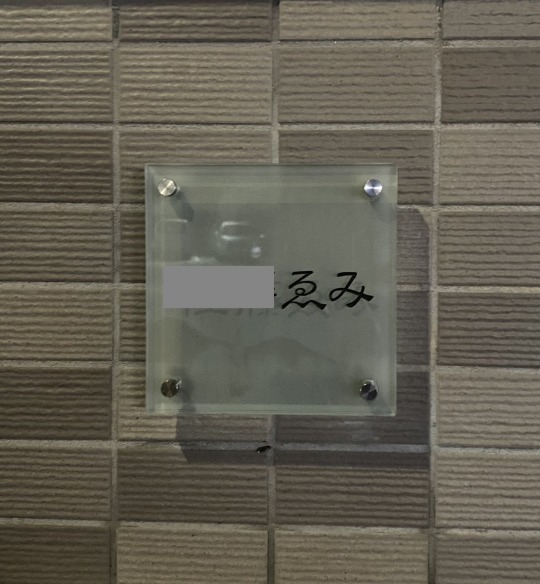
Have we ever done a first name before? Or a hiragana name? ゑみ is functionally read Emi, but technically, it's really Wemi because it uses the mostly obsolete kana character ゑ we.
In modern Japanese, the W sound can only be combined with the vowels A or O, but this wasn't always the case. There used to be characters like ゑ we (katakana: ヱ) and ゐ wi (ヰ) that have fallen out of popular use but still appear sometimes, which is always VERY exciting for me. If you want to type them on a Japanese keyboard, enter 'wye' or 'wyi,' respectively.
And since this is ostensibly a kanji blog, remember that ゑ is derived from the kanji 惠, meaning blessing, grace, favor, kindness, etc. Which today is read megu.mu, megu.mi, kei, or ei.
#learning japanese#kana#obsolete kana#AND TECHNICALLY SPEAKING#i am given to understand that wi is a back formation#but let’s cover it anyway because it comes up#first names
409 notes
·
View notes
Text
Some language and translation trivia from episode nagi
So, I recently reread episode nagi 1-3 in japanese, and since I enjoy translation trivia a lot, I thought I would compile all my observations in a post. Please don’t take this too seriously! While I do have a language degree, I’m not a professional translator. In no way this is meant as a dig towards the professionals working on the official release! These are just some fun facts I thought I’d share.
without further ado, let’s delve into it!
On top of his already limited (kinda childish) vocabulary, Nagi’s speech bubbles often forgo complex kanji and favor writing the words out in hiragana. He sometimes does the same with (foreign) words that should be written out in katakana (example: Barou’s beloved “king”). We know this is a quirk of Nagi’s because he sometimes uses kanji for the same words. The most notable example is his favorite one, mendoukusai, “hassle”—mostly written in hiragana, sometimes shortened, sometimes elongated for dramatic, whiny emphasis, and rarely written out in kanji.
Since kanji are taught by grade in japanese schools, the foregoing them in a certain character’s lines can hint that the guy doesn’t have a higher education. However, in Nagi’s case, I think it’s meant to make him come across as unsophisticated or a bit childish. Or maybe just lazy. I think the former, though, considering how all his compliments always circle back to the same, like, 4 juvenile variations of "amazing".
(more under a cut for length):
Still on the topic of speech patterns, Nagi talks in plain form. For those who don't know what that means, it's an informal register, very common between teens. Nagi seems to use it with his elders, too, though, and that's a bit less common. You're supposed to talk in polite form to strangers and to your elders. Then again, pretty much everyone in blue lock talks that way. There's not a lot of respect for your elders in this series. Or for your peers, lol
As for Reo, he talks in male speech! Still very much informal and common, particularly between rowdy teens, but if plain form can still be acceptable in a lot of social situations, male speech is distinctly cocky, self-confident and impolite, so not what you'd expect from the distinguished heir of a billionaire who prides himself as a businessman in the making, ahah. He talks that way to Ego as well, btw.
Both of them tend not to use honorifics. Reo more so. In all three volumes, Reo used them once, to calm Nagi down while he was angry at Barou. Nagi mostly goes without too, but he sometimes uses them, when the situation calls for it, or a bit ironically. If you're curious, here's what I noticed: he uses "san" for Baa-ya when talking to her (when he leaves Choki in her care), but not when he's talking to Reo about her. He calls Zantetsu "dentist-san" when the latter drops his backstory, and "Zantetsu-kun" when the guy scores after listening to Reo's advice. And when all three finally link up, Nagi tacks on a "sama" to Reo's name while calling him a king (in the chess sense. Fun fact, it might or might not have been a pun, since Reo's name contains the kanji for king btw). That's pretty much it for epinagi so far. He just uses surnames without honorifics (or nicknames) for everyone else normally. Same for Reo.
When talking to Nagi, Reo refers to his mother as 母親 (hahaoya, "mom") and to his father as 親父 (oyaji, "old man, pops") and クソ親父 (kuso oyaji, "shitty old man") respectively. Idk if that changes when he's talking to them tho, as he hasn't yet in epinagi. But so far his contempt seems to be only directed at his father.
Upon seeing Kira, Reo describes him as "Japan's gem", but the word he uses for "gem" is 宝 (takara), treasure, pretty much the same he uses for Nagi (= 宝物 takaramono, or treasured thing, prized possession). Hence Nagi looking up, unimpressed:

To check out what the fuss was about. His face dhsvbdhdhdhsbs When Nagi thinks Reo's talking about Isagi, then, Reo corrects him by pointing his face toward Kira and saying not the dark-haired one, but that "really good looking guy". He calls him an ikemen btw, lmao.
I'm not sure if this was in the eng version too, but Reo calls Nagi and Zantetsu's team up the "neet combo". It's pretty self-explanatory how this relates to Nagi, but I wonder what about Zantetsu screamed "neet" to him.
When Zantetsu adamantly refuses to take Reo's advice, Reo gets super mad and calls him "obaka-sama", which. I can't with his pettiness ahah. Okay, let me explain. He's tacking on an honorific prefix ("o") and the highest honorific suffix ("sama") to an insult. 😂😂 Normally, you use honorifics to pay respect to and elevate the status of whatever or whoever you're tacking them on to. In this case, Reo's using them sarcastically, but he goes extra out of the way to be scathing. Zantetsu hates being called an idiot, but Reo feels he's acting unreasonable with his holier-than-thou attitude, so he upgrades his regular insult to mock that, basically. He's more or less saying, "oh great, revered moron".
Not a linguistic trivia, but. Nagi has a weekly planner for his bread eating habits. The day Reo joins his class to spy on him was a tuesday, cause tuesdays are melon bread days.
When he's making a confident remark, Reo occasionally speaks with a sing-song in his voice.
During the match against team X, Barou mocks Reo and Nagi's coordination and mutual dependence with a jab. He calls them a couple who wear matching outfits. Still laughing about this one tbh
now onto my favorite one
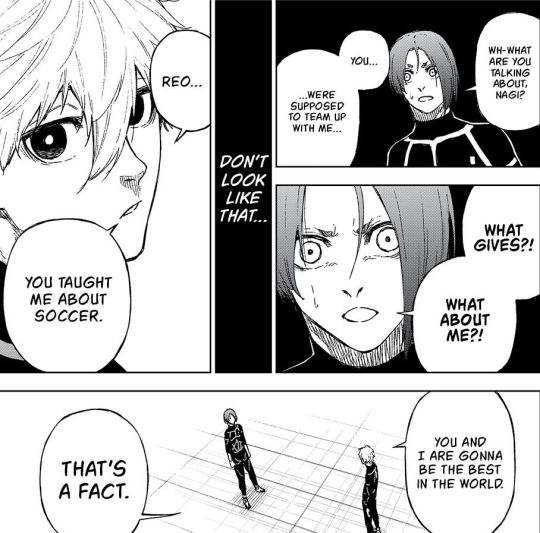
Ever wondered why Nagi’s response here doesn’t come across as reassuring to Reo? Well, I think I have finally figured it out!
While the translation above is 100% correct, I feel like the miscommunication lies in a matter of contextual ambiguity. When Reo says, quote, “You were supposed to team up with me,” in japanese it’s more like, “But teaming up with me is a must!” To which Nagi replies, “You and I are going to be the best in the world. That’s a must.”
The theme (=what is being talked about) of Reo’s sentence is the “must” (zettai) part. Meaning, something that is absolute, unconditional. Reo is making a conjecture, the assumption that they’ll work with each other as they promised, but he’s also implicitly expecting Nagi to agree. He’s saying our combo is the unchangeable condition here. You know this.
Nagi responds with something he means as reassuring, as a confirmation that he has their promise in mind. But since he echoes Reo’s word choice (zettai), and applies it to something else, it comes across wrong, more like he’s correcting Reo on what the “must” actually is. Not teaming up with each other until the end like Reo posits, but the simple agreement that they’ll be world class one day. With or without each other.
This miscommunication is made worse by the fact that Reo’s declared ego is making Nagi the best striker in the world. So when Nagi follows this with a remark about how their team up wasn’t the strongest, Reo of course takes the “correction” to mean “someone else can better help me become the best instead of you. bye. nice hanging out with you till now. see you at the world cup, xoxo”
Simply put, Nagi thought he was explaining himself, but what he got across was that he was rejecting Reo’s ego altogether and moving on. That’s why the art then shows Reo’s ego chains falling apart.
When Bachira asks Nagi if he’s secretly the “super cold type” right after leaving for the 3v3, in japanese it’s a neat, direct callback to the scene in chapter 2 where Nagi tells Reo he's okay with him teaming up with someone stronger than himself, and Reo calls that “heartless.” Both times the word used is the same, 薄情 (hakujou), cold-hearted, heartless, though iirc it was translated differently in english
They both say they feel lonely after their split up. Nagi in response to Bachira’s line as per the previous point (here’s a post I made about it a while back). And Reo when he thinks about Nagi’s change in chapter 13 and says he feels lonely, scared and weak. I will go down with the idea that they’re each other’s first friend.
Ending this on a less sad note, when Rin calls Bachira “bowlcut”, the original phrasing reads okappa, from the mythical creature’s hairstyle. Now please google what an okappa looks like, lmao
__
More epinagi language and translation trivia you might enjoy:
notes on Nagi’s line “I’m gonna say something selfish”
notes (and misconceptions) about Nagi and Reo calling each other “partner”
#Blue lock#Nagi seishirou#Mikage reo#Seishiro nagi#Reo mikage#Episode nagi#Epinagi#Bllk thoughts#I hope this is as fun to read as it was for me to compile!
121 notes
·
View notes
Text
Mikoto's trial 2 (get-together) interrogation theory that i kept in my basement for months

this would make so much sense + convenient for the narrative
ill do a more in-depth analysis of a few questions between 12-18 (when i feel like it) considering it's very heavy towards the masking-koto thing (aka chameleon mido)
actually. sorry. im. impatient. so here we go question 14
TL: Q: What do you think about your name? A: It's not bad.

according to the image i posted before this, this should be mido(ボク) right? why would he answer as if the name referred to in the question was his? because
1. it's convenient. it's convenient for ES (us) (haha get it)
it's much easier to set up a scenario of a victim, lost and confused Mikoto and the monster John, whose deeds were done out of a need to save Mikoto etc. It's easy to understand such a story with simple roles, that's it right? that's all that happened. therefore his(ボク) involvement is not needed, if anything it will raise more questions and risk Mikoto being unforgiven.
2. because he can hide under the guise of being 'John', once again concealing his own existence
ah but, ive found where the contradictions meet
he doesnt fully hide himself enough...
lets take a look at these following questions:


I won't talk about the contents of these questions, but please pay attention to the hiragana written here
As you can see, to refer to Mikoto (as he(ボク), the speaker isnt Mikoto), the character for boku is written in hiragana (ぼく)
Following this, let's assume that pronouns written in hiragana is meant to refer to whoever isn't our speaker (ボク-kun)
Then lets take a look at the following question:
TL: Q: Do you know why you weren't forgiven? A: It was おれ's fault.
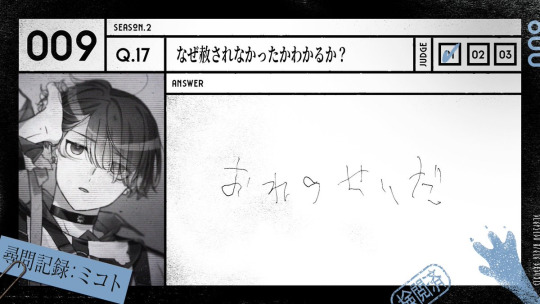
In this interrogation, ore is also written in hiragana (おれ) and with the assumption above, we can assume that this is referring to John.
We also know that John refers to himself using kanji ore (俺) => The speaker/writer of this question CAN'T be John. (using the assumptions above as basis)
This is where the points contradict each other
- Q.14, mido(ボク) assumingly agrees to "John" being his name to hide under the guise of being John
- Q.17, mido(ボク) refers to John in 3rd person, hence contradicting himself and outing himself as NOT JOHN
or simply, he thought Es wouldn't notice how he words his answers anyway because there is already an assumption that there is only Mikoto and John so he doesn't put effort into masking himself fully.
Well that's about it
I'll talk about minigram katakana ore(オレ) being mido one day
#milgram#milgram project#milgram mikoto#mikoto kayano#midokoto#john milgram#milgram theory#milgram analysis#well its midokoto-centric analysis but whatever ig#MTLtheorymaxxing
32 notes
·
View notes
Text
Tsurune Book 3 Afterword
Full list of translations here
Time for my unsolicited book review!
Tsurune Book 3 is one of the books of all time.
I'm not trying to be funny, that is my true opinion about this book.
I've said before that it feels like the author was forced to write this book in a hurry, and after finishing it, I can only say that those feelings have only grown stronger. I think the author was going for an abstract and spiritual feeling but it didn't really work out. It only made the story hard to follow, and the tendency for the novel to jump from topic to topic seemingly at random didn't help. It's probably super obvious in the author's head, but that doesn't matter if the reader can't follow their thinking. I really do question what the editors are doing because I'm not sure if they're giving the author proper feedback.
The novel also suffers from trying to do a lot but not doing any of it satisfactorily. It introduced a lot of new characters and plot points but never really did anything with them?? The new first-years faded out of the story after the beginning and idek what's going on with Kuon. As for the new school Haneina...the author just gave them one """quirky""" trait each and called it a day. It kinda happened with Tsujimine too but it was more subtle with them, and I think the central relationship of Nikaidou and Fuwa was compelling and well-written. Asahina and Eddie, on the other hand, are just really weird?? I honestly don't understand what their narrative role is supposed to be??
This might be a controversial opinion but I feel like the anime tells a more coherent, polished version of the story. I was rewatching it the other day and I was kind of blown away by how the visual quality improved between the seasons. S1 was definitely not bad looking but S2 is just *chef's kiss*. Idk if there's going be an S3 but it will be interesting to see how (or if) they adapt book 3
Anyways i don't want to say that book 3 is kinda pointless since it did give us some reveals (perhaps unnecessarily) but on the other hand...i feel like book 2 had a nice ending for the series as a whole as well? idk. if there is going to be a book 4, i hope it will be all about Kazemai hunting down Masa-san's bio dad
Thanks for following along with me! I know I've been really slow with this so im glad people are still interested haha

Previous |
This happened when I was reading a certain foreign novel’s translated version. As I was reading through the point of view of a character whose first-person pronoun was “私” (watashi), I came across a surprising description. To my surprise, the character I thought was a woman suddenly started to shave their beard. Later, I learned that there was an unspoken rule that men used “watashi” written in kanji, and women used “watashi” written in katakana.
Minato’s personal pronoun is “ore” in hiragana. It encompasses the meaning of “undifferentiated,” someone of unknown gender who is neither male or female, although his physical body is that of a boy. Nanao’s pronoun is “ore” written in katakana, a person of unknown nationality who can’t be classified as either Japanese or foreign, a person who wavers between the two, a hybrid existence that crosses that line. Takigawa Masaki is also someone who hovers between “human” and “not human,” so his name is written as “Masa-san” (マサさん) in the text. Shuu is also a character who is in between.
I’m attracted to such “fluctuating” and “swaying” things. Things that can’t fixed or distinguished in form or state, as changeable as “water.” Kaleidoscopic freedom and loneliness are two sides of the same coin. People who fluctuate cannot stay in one place, and instability follows. Because they can’t be classified, they do not belong anywhere, nor can they be emphasized with. I wanted to somehow hold back those who can’t stop walking. I wrote this story because I wanted them by my side.
Changing the topic, I was on my way home from a domestic trip. After spending a relaxing time listening to the chirping of birds on an isolated island, I heard a large explosion sound when I got off at a certain station in Tokyo. The warning signal of a train entering the station continued to sound, and announcements reverberated from all over. I forgot to bring my earphones, so I was unable to plug my ears and ran all the way to the edge of the platform. Glowing neon lights reflected diffusely, and the words on billboards and other signs crowded in my field of vision like a herd of horses. I almost thought that I had time travelled back to wartime. We had become so accustomed to the flood of sound, light, and text that we don’t realize we’re on the verge of drowning.
Tsurune is the story of masters and disciples and bow friends with the theme of rebirth, and it began as the story of seven archers. The theme of Volume 3 is “Meigen, that is the sound of the dawn,” and I wrote about shari kenshou (seeing true nature through the shot).
I would like to express my sincere gratitude to everyone involved in the making of this book: Koyama Kyugu-sama, who I’ve interviewed, T-sama of the KA Esuma Bunko Editorial Department, Kyoto Animation-sama who was in charge of illustrations, the proofreaders, the novel’s official website, the printing company, and the distributors. The letters I’ve received are my treasures, and I have displayed them in my tokonoma alcove. I would like to thank my beloved kyudo teachers and bow friends, my precious friends, and my supportive family.
Last but not least, I would like to express my deepest gratitude to all the readers who have read this far.
I hope for the day when the beautiful tsurune of the archers will resound.
Ayano Kotoko
Spring 2022
Previous |
37 notes
·
View notes